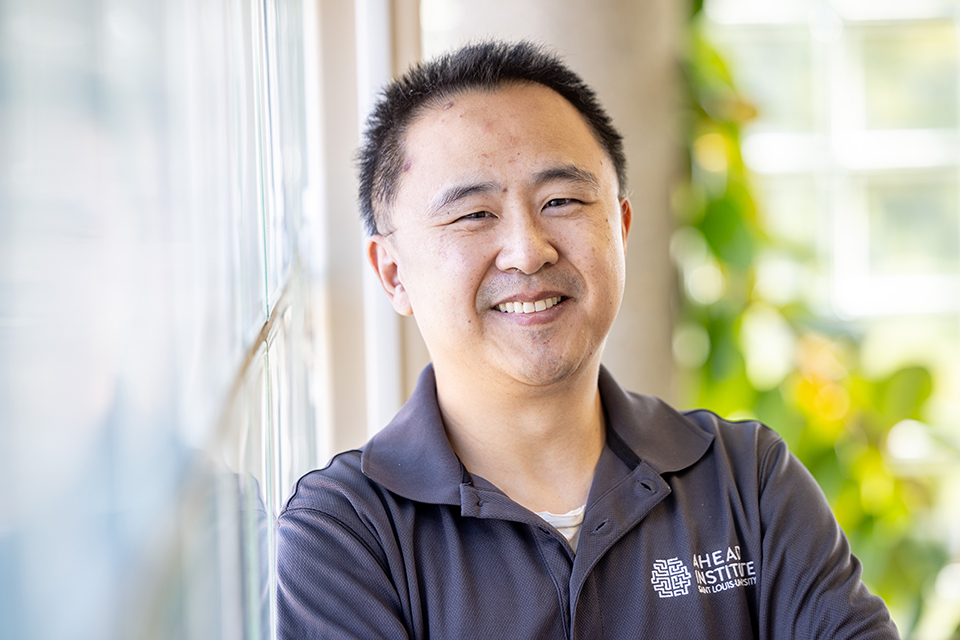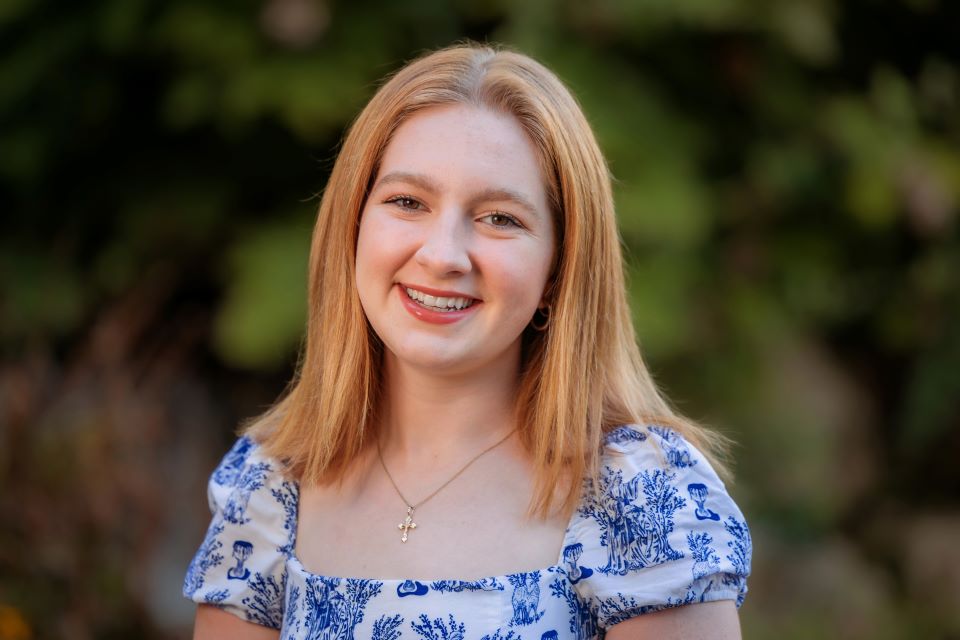SLU Study: Black Patients with Heart Failure Less Likely to Receive Palliative Care
11/12/2024
ST LOUIS — A study by researchers at Saint Louis University shows that only one in eight patients with heart failure in the United States receive palliative care consultations within five years of diagnosis.
Recently published in the Journal of the American Heart Association, the study highlights the alarmingly low uptake of palliative care among adults with heart failure in the U.S., especially compared to patients with similarly fatal cancers. The study also highlighted significant racial and geographic disparities. Black people were 15% less likely to receive palliative care compared to their white counterparts.

Zidong Zhang, Ph.D., biostatistician at the AHEAD Institute at Saint Louis University School of Medicine. Photo by Sarah Conroy.
This disparity is particularly concerning given the higher risk and mortality rates for cardiovascular disease in the Black population. Over the past decade, the American Heart Association (AHA) and the European Society of Cardiology have recommended integrating palliative care into managing heart failure.
"However, anecdotal reports suggest that most patients with heart failure do not receive palliative care, and those who do typically receive it only in the last two to three weeks of life," said Zidong Zhang, Ph.D., biostatistician at the AHEAD Institute at SLU's School of Medicine, the paper's senior and corresponding author.
Zhang, a health service researcher focusing on palliative and patient-centered care for cardiovascular disease and cancer, has presented his research on patient outcomes at national conferences and published his findings in peer-reviewed journals.
"To our knowledge, this is the first study to investigate the uptake of palliative care consultation following a heart failure diagnosis in the general U.S. population. Unlike the previous studies focusing on Medicare beneficiaries or veterans, our research provides a more general insight into early palliative care integration for heart failure across the entire nation," he explained.
In this retrospective study, Zhang and his co-authors analyzed data from a national all-payer database covering 2011 to 2018. The study cohort included nearly 170,000 patients aged 18 to 80 from all country regions. Some of them had advanced heart failure or even had received advanced therapies such as left ventricular assist devices or cardioversion. Additionally, the study also demonstrated the heterogeneity in the relationship between receiving palliative care and treatment options for acute heart failure and heart failure worsening.
Zhang and his co-authors found that patients who did not have cardiogenic shock, a life-threatening condition in which your heart suddenly can't pump enough blood to meet your body's needs, but received inotropic therapy, drugs that tell your heart muscles to beat or contract with more power or less power, were less likely to have palliative care consultations. However, among patients treated for cardiogenic shock with advanced therapies, the likelihood of receiving palliative care almost tripled. Zhang and his co-authors attributed this discrepancy to the intended purpose of treatment and clinical inertia in managing complex cases.
Zhang said the latest AHA guidelines emphasize the early integration of palliative care consultation for all patients with heart failure, particularly when evaluating patients for advanced therapies. Study data shows a significant gap between these recommendations and real-world practice. Zhang said there's a need for systemic reform to achieve early integration of palliative care and timely consultation.
"These might include removing barriers in the payment system for concurrent care, assisting physicians in determining when to initiate the palliative care conversation with patients, and, in a health system, expanding outpatient and community-based palliative care service and streamlining the referral and transition of palliative care from cardiac care to inpatient service to community," he said.
Other authors include Divya S. Subramaniam, Ph.D., of Department of Health and Clinical Outcomes and the AHEAD Institute, Saint Louis University School of Medicine; Steven W. Howard, Ph.D., of University of Alabama at Birmingham; Kenton J. Johnston, Ph.D., of Department of Internal Medicine, Washington University School of Medicine; William H. Frick, M.D., of Department of Internal Medicine, Saint Louis University School of Medicine; Kimberly Enard, Ph.D., of College for Public Health and Social Justice, Saint Louis University; and Leslie Hinyard, Ph.D., of Department of Health and Clinical Outcomes and the AHEAD Institute, Saint Louis University School of Medicine.
Latest Newslink
- Kathryn Mitchell Pierce, Ph.D.: 1955-2025An obituary for Kathryn Mitchell Pierce, Ph.D., an associate professor at Saint Louis University's School of Education
- Saint Louis University Student Speaks About Leadership and Disability at Ignatian Family Teach-In for JusticeSaint Louis University senior Grace LoPiccolo shared her personal leadership journey at the 2025 Ignatian Family Teach-In for Justice. The event, held annually in Washington, D.C., is the nation’s largest Catholic social justice advocacy day.
- SLU Research Shows Surge in Alcohol-Related Liver Disease Driving ‘Deaths of Despair’Researchers at Saint Louis University School of Medicine say deaths from alcohol-related liver disease have surged in recent years, and the increase is hitting people without a college degree the hardest. While nearly every demographic group is seeing higher death rates—including those with college degrees—the gap between economically disadvantaged groups and more affluent ones is growing, according to new research.
- Saint Louis University Joins Multi-Disciplinary Research Team to Enhance Stress Resilience in SorghumSaint Louis University is part of a multi-disciplinary team, led by the Donald Danforth Plant Science Center, to deepen the understanding of sorghum, a versatile bioenergy crop, and its response to environmental challenges.The U.S. Department of Energy (DOE) Biological and Environmental Research (BER) program supports the three-year $2.5 million project for Genomics-Enabled Understanding and Advancing Knowledge on Plant Gene Function. Saint Louis University will receive $437,039 for its portion of the study.
- SLU Graduates Celebrated at Midyear CommencementSaint Louis University celebrated its Midyear Commencement on Saturday, Dec. 13, inside Chaifetz Arena. More than 1,900 guests watched as 600-plus SLU students walked across the stage and left as graduates.
- Why Do Raccoons Cross the Road? SLU, St. Louis Zoo Research Shows They Don'tA new study led by researchers from Saint Louis University, the Saint Louis Zoo, and partner organizations set out to understand how raccoons use space in one of the nation's largest urban parks.













